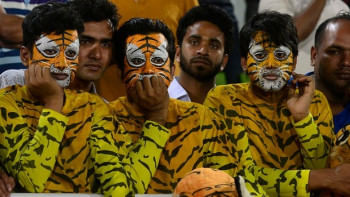Coming to terms with the dire state of Bangladesh men's cricket

It all started when the captain at the time announced his surprise retirement in the middle of a series against Afghanistan last July, throwing Bangladesh men's cricket team into the deep end of a pool of chaos and controversy. But that's not the whole story. How about we rewind 24 years into the past, when Bangladesh achieved its Test playing status, a decision deemed premature by many?
No, that's not it either, there's been plenty of resources, funding and opportunities to build the team since then. Okay, so what about the quality of domestic competitions and proper nurturing of young promising talent? Surely, the Under-19 team winning the World Cup was not a fluke. What did they do right? How can we elevate their experience and lessons to match the global stage and bring the winning habit to the national team?
Coming to terms with the current state of the men's national team is reminiscent of detangling an intricately knotted web. All the possible factors that led the team to its current state are deeply intertwined with each other and have created a mess that has not been cleaned up in a long time.
The ODI World Cup 2023 left a sour taste in everyone's mouth as things seemed to go from bad to worse. As convincingly as the team had started its World Cup campaign against Afghanistan, they did not reserve any of the firepower for the remaining matches. Then there was the win against Sri Lanka, where the timed-out decision ensured that it too was mired in controversy. The players' motivation and body language seemed to have flattened out. As disappointed as the fans were in the players' performances, it was not difficult to understand that the circumstances behind the scenes had a large role to play.
Other than the lack of consistency, Bangladesh also seems to struggle with expectations. After losing the T20I series to USA, they finally roared back in the last match of the series to seal their first 10 wicket victory in the format. In the third match, the team played how they were expected to play against a team ranked far below them. They proved that they were certainly able to deliver a convincing performance against an opposition that should not be able to match Bangladesh's skill level and experience. It thus remains a mystery as to why the Bangladesh team waited until the series was lost to play according to their abilities.
Bangladesh went on a tour of New Zealand at the end of 2023 where they performed reasonably. They lost the ODI series 2-1 to the hosts, where they bowled out the kiwis for less than one hundred in the winning match, and tied the T20I series 1-1 as one match was washed out. Nazmul Hossain Shanto seemed well suited to his role as captain. Having already proved his batting abilities, he also showed glimpses of charisma that one expects in a leader and a positive attitude as exhibited in his press conferences. It was not a massive turnaround, but Bangladesh's performance against the Kiwis could be perceived as a semblance of hope that the team was beginning to find its rhythm after months of uncertainty. However, it is difficult to manufacture consistency when there are so many changes constantly being introduced.
Since the New Zealand series, 23 players have featured across the one-day and T20 formats and five openers have been given a stint in arguably the most critical batting position. The BCB's approach seems to be to divide the team into sets of players who specialise in separate formats of the game. But the reasoning behind this approach is difficult to grasp as an outsider. Given that consistency is Bangladesh's toughest challenge, it would make more sense to rely on the players who do perform well—even if they do so primarily in one format. Then, the likelihood for the players to be able to capitalise on that positive energy and build team spirit increases.
In contrast, in an already struggling team, if a player does well and then is promptly taken out of consideration for upcoming selections, it leaves the team back at square one trying to figure out what works well for their success. This division of specialisation approach might work better for a more mature and confident team who have already uncovered and solidified what their strengths and weaknesses are, and thus can reliably make decisions that favour the best outcomes. Bangladesh does not have that privilege yet. Instead, they need to make the most of what they have. Bangladesh will not find consistency if they continue rotating different players across formats.
Other than the lack of consistency, Bangladesh also seems to struggle with expectations. After losing the T20I series to USA, they finally roared back in the last match of the series to seal their first 10 wicket victory in the format. In the third match, the team played how they were expected to play against a team ranked far below them. They proved that they were certainly able to deliver a convincing performance against an opposition that should not be able to match Bangladesh's skill level and experience. It thus remains a mystery as to why the Bangladesh team waited until the series was lost to play according to their abilities. Based on the last match, it can be argued that the team's talent is not the issue. But in competitive sport, success hinges on a combination of impactful factors, and the management should be able to identify these factors and optimise them to ensure the best results.
In order to measure improvements, you have to keep certain things constant, so that the benefits of the changes you introduce can be observed. There are so many factors in the mix that have contributed to the current state of Bangladesh cricket that it is impossible to pinpoint to one reason or even a set of coherent reasons responsible. This leaves us lifelong fans frustrated, disappointed, and sad. We distance ourselves from the sport, stop watching the games, and wish that the news of the results doesn't reach us. But to remain unaffected is not a choice we can make. Sport is not a science. Once you land on your desired approach, elevating the game is nothing short of an art form. But when the fundamentals seem shaky, there is no room for art to flourish.
Madiha Athar Khan is a columnist for The Daily Star and a technical writer at Optimizely. She also leads the Art for Soul movement. She can be reached at [email protected]
Views expressed in this article are the author's own.
Follow The Daily Star Opinion on Facebook for the latest opinions, commentaries and analyses by experts and professionals. To contribute your article or letter to The Daily Star Opinion, see our guidelines for submission.

 For all latest news, follow The Daily Star's Google News channel.
For all latest news, follow The Daily Star's Google News channel. 









Comments